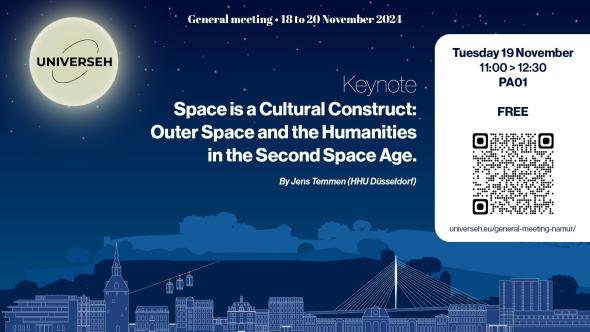UNIVERSEH · Keynote - “Space is a Cultural Construct: Outer Space and the Humanities in the Second Space Age”
As part of the General Meeting of the European UNIVERSEH alliance, we invite you to take part in this keynote.

As part of the General Meeting of the European UNIVERSEH alliance, we invite you to take part in this keynote.

The early 21st century has seen a reinvigoration of space exploration both by private and state actors that seek to explore, exploit, settle, and own outer space and its celestial bodies.
According to scholars and scientists alike, this reinvigoration warrants labeling our time as the “Second Space Age”. Key actors of this Second Space Age have framed the exploration and colonization of outer space as not only progressive and desirable, but also as inevitable to ensure the survival of humanity in face of the multiple crises of the Anthropocene (climate change, over/underpopulation, resource scarcity etc.). Within this “astrofuturist” framework, outer space has become a utopian space that allows for a transformative posthuman experience for all of humanity, for humanity’s escape from its terrestrial limitations, for breaking with humanity’s terrestrial history, and even for human immortality. The way that outer space is a key ingredient for utopian vision of humanity’s future highlights that outer space is a cultural construct negotiated in an interplay between science, technology and culture. These “astrocultural objects”, which are central to ascribing meaning to outer space and to stirring the collective imagination, underline the cultural embeddedness both of outer space and our practices of exploring it. A critical engagement with space exploration must therefore go beyond questions of mere technological feasibility then, and instead also interrogate, for example, the prevalence of visions Mars colonization as a remedy for climate change, the politics of race/class/gender in privatized outer space, the continuities of capitalist-colonial structures in the private space industry, or the dominance of specifically US-American frontier discourses of renewal and expansion in allegedly utopian visions of humanity’s future in space.
If the exploration of outer space is to play a key role in humanity’s future beyond our planetary crises, the humanities have to play a key role in critically engaging with our visions for that future.
Contact : UNIVERSEH - universeh@unamur.be